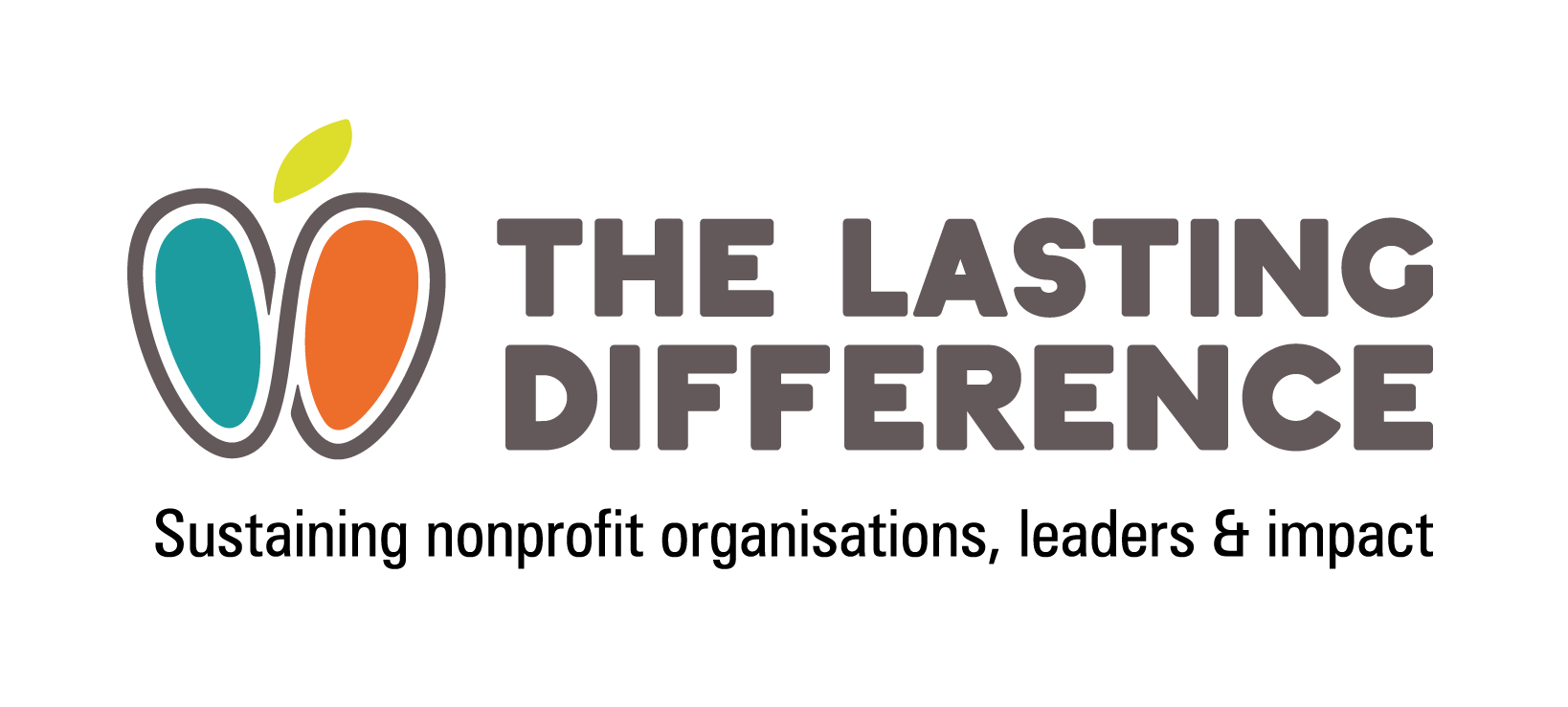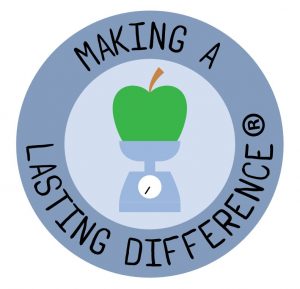
About The Lasting Difference® Symbol
Update: we are retiring the Symbol in summer 2024 and are not taking new applications. Existing symbol holders can continue using it though.
- The Lasting Difference Symbol helps you to demonstrate to funders, partners, staff and communities that your organisation is committed to developing good practice.
Symbol holders join a community of practice, with facilitated peer support and an annual networking event to share ideas and generate new learning about sustainability. Along with our subscribers, you will also be our first port of call when we have new opportunities and resources to share.
“It’s important to feel part of such a warm and welcoming group of talented leaders, to take part in the practice sharing events and to share the learning from the incredibly useful resources produced by your amazing team.” (Lasting Difference Symbol holder)
“Being a symbol holder is hugely beneficial both as an individual and an organisation. It is a declaration of our commitment to create a lasting difference.” (Lasting Difference Symbol holder)
Examples include organisations whose strategies contain organisational sustainability goals; boards forming sub-committees on the topic; senior managers creating lateral leadership opportunities, teams developing criteria for prioritising funding applications and projects creating exit strategies for their work.
The Symbol Holders
All sorts of non-profit organisations (charities, social enterprises or public sector organisations) have used The Lasting Difference symbol. Find out more about our existing symbol holders below.
“I hope you are aware of the profound, lasting and transformative impact you have on the individuals and organisations you provide your support to. Of all of the ‘memberships’ we could be part of, being a symbol holder has been the most influential, challenging (in a positive way) and long standing toolkit we have ever engaged with.”
Befriending Networks
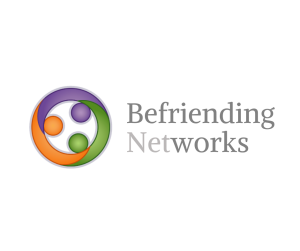 Befriending Networks are an intermediary organisation who involve their members in their evaluation, learning and improvement. They have developed their income generation strategy to ensure their services are sustainable across the UK from a range of income sources.
Befriending Networks are an intermediary organisation who involve their members in their evaluation, learning and improvement. They have developed their income generation strategy to ensure their services are sustainable across the UK from a range of income sources.
“I hope that by becoming a symbol holder and maintaining our close links and using the new resources we can inform our thinking and practice over the next two years to continue our journey and ensure that we don’t grow too quickly or become unsustainable by poor planning, leadership or decisions.”
Camphill School Aberdeen
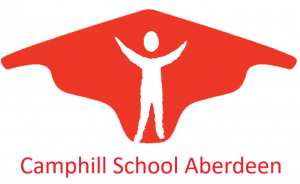 Camphill has developed their own self-assessment tool, drawing on some of the principles from the Lasting Difference and Lasting Leadership guides. They’ll be using this to involve their teams in identifying priorities. They’ll also be using the Lasting Difference self-assessment to review their sustainability as an organisation. This will then feed into a new sustainability plan for the organisation.
Camphill has developed their own self-assessment tool, drawing on some of the principles from the Lasting Difference and Lasting Leadership guides. They’ll be using this to involve their teams in identifying priorities. They’ll also be using the Lasting Difference self-assessment to review their sustainability as an organisation. This will then feed into a new sustainability plan for the organisation.
“It will provide us with the tools to understand change and adapt to it without compromising future capacity.”
Carers Link
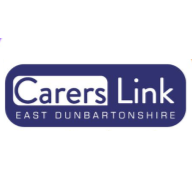 Carers Link has written long-term sustainability into their strategic plan, with a focus on developing a sustainable funding model, building an evidence base for the impact they make, developing approaches to succession planning and fully involving the team in the journey
Carers Link has written long-term sustainability into their strategic plan, with a focus on developing a sustainable funding model, building an evidence base for the impact they make, developing approaches to succession planning and fully involving the team in the journey
“Making the commitment to doing something is the first step in making the space and time to then follow through.”
Dyslexia Scotland
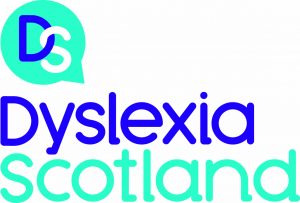 Dyslexia Scotland have embedded sustainability thinking into their strategic planning processes, supporting good governance, developing funding plans and involving volunteers.
Dyslexia Scotland have embedded sustainability thinking into their strategic planning processes, supporting good governance, developing funding plans and involving volunteers.
“We found the resources and ways of working dyslexia-friendly, accessible and inclusive. I would encourage other organisations to use the practical and inspiring resources and ideas in this toolkit – and to join a new community of practice, to support the ongoing challenges of sustainability in the third sector.”
Future Pathways
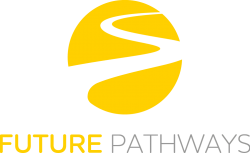 Future Pathways are a national service who support people who experienced childhood abuse or neglect in Scotland. Sustainability is firmly embedded in their work, providing sustainable impact for those they support; promoting reflection and learning through their quality assurance tools and generating a legacy of learning for future services.
Future Pathways are a national service who support people who experienced childhood abuse or neglect in Scotland. Sustainability is firmly embedded in their work, providing sustainable impact for those they support; promoting reflection and learning through their quality assurance tools and generating a legacy of learning for future services.Health in Mind
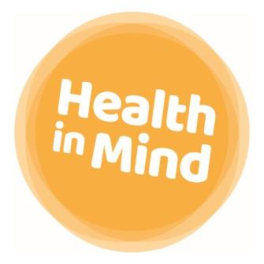 Health in Mind promote positive mental health and wellbeing in communities across Scotland. By involving a wide range of stakeholders in their strategy development, using the Lasting Difference toolkit as a focus, they have firmly embedded sustainability in their new strategy.
Health in Mind promote positive mental health and wellbeing in communities across Scotland. By involving a wide range of stakeholders in their strategy development, using the Lasting Difference toolkit as a focus, they have firmly embedded sustainability in their new strategy.
“Integrating sustainability into our plans ensures that as an organisation we can be there for people where, how and when they need us. It helps us understand when to say yes and when to say no – to focus on our purpose, strengths and raise our profile whilst keeping people and communities at the heart of all we do.”
Lucy Faithfull Foundation Scotland
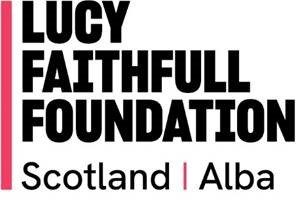 The Lucy Faithfull Foundation Scotland helped us to develop the ‘Beyond Survival’ resource to enable survivor support organisations become more sustainable. They took the learning from this back to their organisation and conducted a sustainability self-assessment to identify their main challenges. They now have an action plan in place and are starting to conduct self-assessments for each of their projects. They are embedding sustainability thinking into their work and it is now a standing item during staff development meetings.
The Lucy Faithfull Foundation Scotland helped us to develop the ‘Beyond Survival’ resource to enable survivor support organisations become more sustainable. They took the learning from this back to their organisation and conducted a sustainability self-assessment to identify their main challenges. They now have an action plan in place and are starting to conduct self-assessments for each of their projects. They are embedding sustainability thinking into their work and it is now a standing item during staff development meetings.
“Integrating sustainability into our forward planning will allow us to have clear exit strategies for each project. It has also encouraged us to identify potential challenges which may threaten our long-term future and encourage us to have action plans which identify clear lines of responsibility. It allows us to identify and consider any threats to sustainability in good time so that a potential problem does not become a crisis.”
Merida Associates
 Merida Associates are the first commercial partner to be awarded the symbol. The Lasting Difference licence permits non-commercial use only, but intermediary organisations and consultancies like Merida can apply for a separate commercial licence. The Merida team now support clients using Lasting Difference principles in their consultancy throughout the West Midlands.
Merida Associates are the first commercial partner to be awarded the symbol. The Lasting Difference licence permits non-commercial use only, but intermediary organisations and consultancies like Merida can apply for a separate commercial licence. The Merida team now support clients using Lasting Difference principles in their consultancy throughout the West Midlands.Sacro
 for people affected by homelessness and to people with learning disabilities and mental health challenges. They used Lasting Difference principles to involve people from across their organisation in creating a strategy which focuses on their core values. They are now investing in sustainable leadership by creating capacity for leadership development.
for people affected by homelessness and to people with learning disabilities and mental health challenges. They used Lasting Difference principles to involve people from across their organisation in creating a strategy which focuses on their core values. They are now investing in sustainable leadership by creating capacity for leadership development.
“We believe that this approach makes us braver – saying no is a brave thing to do – we will all be focused on our core and work towards a stronger organisation. We will also get even better at the things we do best.”
SIAA
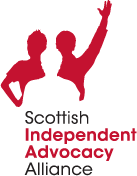 Through their Lasting Difference self-assessment, SIAA have identified the need to focus on involvement and impact. They have adapted their approaches to better understand and respond to their members’ needs during the COVID-19 pandemic. They have improved their approach for data collection to better understand and report on their own impact.
Through their Lasting Difference self-assessment, SIAA have identified the need to focus on involvement and impact. They have adapted their approaches to better understand and respond to their members’ needs during the COVID-19 pandemic. They have improved their approach for data collection to better understand and report on their own impact.
“As a small organisation, the way we keep organisational sustainability as a central consideration has been to have regular discussions internally and with the board around member involvement and impact measurement and shape our work plan around member feedback.”
Shelter Scotland
 Shelter Scotland sets out its long-term commitments in a ten-year strategy. The team are clear on how to measure impact, use this to identify successes and potential improvements, and have involved the whole organisation in strategy development. This stands them in good stead for making a lasting difference.
Shelter Scotland sets out its long-term commitments in a ten-year strategy. The team are clear on how to measure impact, use this to identify successes and potential improvements, and have involved the whole organisation in strategy development. This stands them in good stead for making a lasting difference.
“It keeps us focused on our organisational purpose and ensures that is our north star. The most important element has been to challenge ourselves to only deliver what meets our purpose. This means saying no and it also means stopping things we currently do or reshaping them to ensure they are future-focused.”
Victim Support Scotland
“The toolkit has opened our eyes to the ways that we can ensure our sustainability and future as an organisation, which ultimately will help victims and witnesses across Scotland.”
Voluntary Action North Lanarkshire
 Voluntary Action North Lanarkshire are ambitious in their aims to build the sustainability of local voluntary organisations. They have developed an action learning programme where participants can build their capacity with peer support. Alongside this, they have focus on their own strategic development.
Voluntary Action North Lanarkshire are ambitious in their aims to build the sustainability of local voluntary organisations. They have developed an action learning programme where participants can build their capacity with peer support. Alongside this, they have focus on their own strategic development.
“We have refocussed our strategic objectives, strengthened our Board, reviewed organisational structure, in the process of recruiting and exploring funding to support the achievement of our strategic objectives, and starting the process of systematising our evaluation and learning approach.”
Interested? Click on the link to download an application form
The Lasting Difference Symbol Application Form
GET INVOLVED
Sign up for our occasional newsletter for new ideas and resources.
